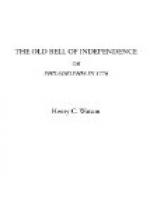“I don’t know as much about it as you may obtain from history,” replied old Harmar, speaking for himself. “Our line was in another neighborhood.”
“I should suppose Mr. Morton was acquainted with the facts, as he was up in that part of the country about that time,” observed Wilson.
“I was; and do know all that one engaged in the expedition might tell me,” replied Morton. “Furthermore, I have no objection to communicating my information.—I would thank you for a glass of water, Mrs. Harmar.” The water was handed to the old man, and, after a refreshing draught, he proceeded with his narrative.
“You must know, that in the latter part of 1771 General Charles Lee was surprised and taken prisoner by a detachment of British troops. This was the result of his own carelessness. The British chuckled over his capture, saying that they had caught the American palladium, as if Lee was at all necessary to the success of our cause. However, the Americans considered him a valuable officer, and Major William Barton, of the Rhode Island line, resolved upon retaking him or procuring his exchange.
“Some months elapsed, after the capture of General Lee, before an opportunity offered of effecting the object which Major Barton had in view. In the month following that of the capture, the enemy took possession of the islands of Rhode-Island, Canonicut, and Prudence. Major Barton was then stationed at Tiverton, and for some months anxiously watched the motions of the enemy, with but feeble prospect of obtaining the opportunity he desired.
“At length, on the 20th June, 1777, a man by the name of Coffin, who made his escape from the British, was seized by some of the American troops, and carried to Major Barton’s quarters. Major Barton availed himself of the opportunity to inquire respecting the disposition of the British forces. Coffin on examination, stated that Major-General Richard Prescott had established his head-quarters on the west side of Rhode-Island, and described minutely the situation of the house in which he resided, which he said was owned by a Mr. Pering. His account was a few days after confirmed by a deserter from the ranks of the enemy. Major Barton was now confirmed in his belief of the practicability of effecting his favorite object:—but serious obstacles were first to be encountered and removed. Neither his troops, nor their commander, had been long inured to service; and the intended enterprise was of a nature as novel as it was hazardous. Besides, Major Barton was aware that the undertaking, should it prove unsuccessful, would be pronounced rash and unadvised, and, in its consequences, though his life might be preserved, be followed by degradation and disgrace. Moreover, to involve in the consequences of an enterprise, devised and undertaken without previous consultation with his superiors in rank, the interest and perhaps the lives of a portion of his brave countrymen, was a subject that excited reflections calculated to damp the ardor and appall the courage of the bravest minds. Still, however, upon mature reflection, aided by a consciousness that its only motive was the interest of his country, he resolved to hazard his reputation and his life in the attempt.




